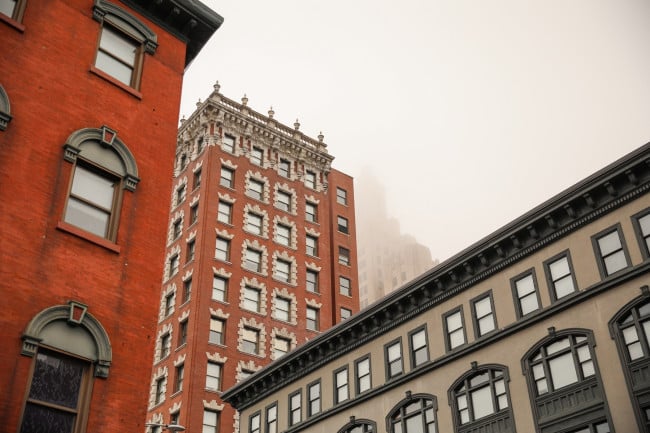The pros and cons of rent to own in NYC

A two-bedroom apartment at One Manhattan Square, available to rent for $7,292 with the option to buy.
When you're looking for an apartment in NYC, where rents in Manhattan and Brooklyn have been going up all year, it's tempting to imagine those monthly payments being put to better use, like for a down payment. Rent-to-own scenarios have been pretty much unheard of in NYC, but that is changing with the launch of a new program that credits rental payments toward a purchase at One Manhattan Square, the 80-story glass skyscraper on the Lower East Side.
The move by Extell, one of NYC's leading developers, was likely a result of NYC's oversupply of new luxury condos, where a glut has stalled the market. In a previous attempt to kickstart sales, Extell offered to pay several years of common charges. The rent-to-own program is another “creative marketing scheme to sell the apartments,” says Jerome Strelov, a real estate attorney with Frankfurt Kurnit Klein & Selz, who is not associated with the Extell program.
Extell's rent-to-own offering allows you to credit a year of rental payments towards a condo purchase if you buy within 12 months. This kind of arrangement isn't common in New York City, predominantly a city of renters where the median sales price for a Manhattan apartment hovers around $1 million.
Jeffery Reich, a real estate attorney with Schwartz, Sladkus, Reich, Greenberg, Atlas, says it is more often something seen at the lower end of the market. "If you don't have the down payment it is a great mechanism to create equity towards that deposit," he says.
However, Strelov points out these kinds of arrangements are complicated and there are lots of variables to think about when considering if this is a good deal for you.
Is there a premium in the rent?
If the rent you are being offered is competitive for the neighborhood, then Strelov says renting with the option to buy will not hurt your wallet and gives you time in the building to see if you like living there. Reich says he sees "no downsides" for a buyer. "It's like test driving a car for a year. You get to test out the neighborhood, the building, the amenities."
Strelov is more cautious, saying "if you are paying a little higher for the privilege of having the option, it may not be worth it currently with prices going sideways, if not going south."
You'll need multiple contracts
If you thought buying an apartment in New York City was complicated, negotiating a rent-to-own arrangement is even more so. Your legal fees will likely be higher because you will be drafting an option agreement, a purchase agreement, and a rental agreement, Strelov says.
"The option and purchase agreements might be the same, but there will be two or three contracts and lenders don't usually allow for 100 percent of the rent payments to apply to the down payment." This can be another obstacle for buyers, Strelov says. Most likely, the rent will be applied to the closing costs and the purchase price.
"The devil is in the detail," he says, pointing out you'll also want to make sure the option agreement is "watertight" to avoid any confusion about how and when to exercise your right to buy so you don't lose the equity you've paid as rent.
Consider mortgage rate fluctuation
You are unlikely to be able to apply for a mortgage until you are ready to close on the condo purchase. If it's a question of buying now or renting first with the option to buy, there is always the "gamble" that mortgage rates might go up, Strelov says. If, however, you are not in a position to buy until you exercise your option, Reich says it's irrelevant to second guess mortgage rates or indeed purchase price.
There may be other uncertainties
Consider why the rent-to-own option is being offered in the first place. Is it because the sponsor is struggling to sell apartments? If so, why? You'll want to do your due diligence on the building to make sure you are comfortable with any risks associated with the purchase.
The sponsor may have a preferred lender who will be happy to finance your purchase but if you want to sell further down the line, say in a year or two, your buyer may need financing and a bank will look at the percentage of ownership in the building.
Reich says if he was advising a buyer he'd make sure the purchase price reflected some of the risks associated with buying into a building where the sponsor might continue to own the majority of the units for some time.
You Might Also Like































